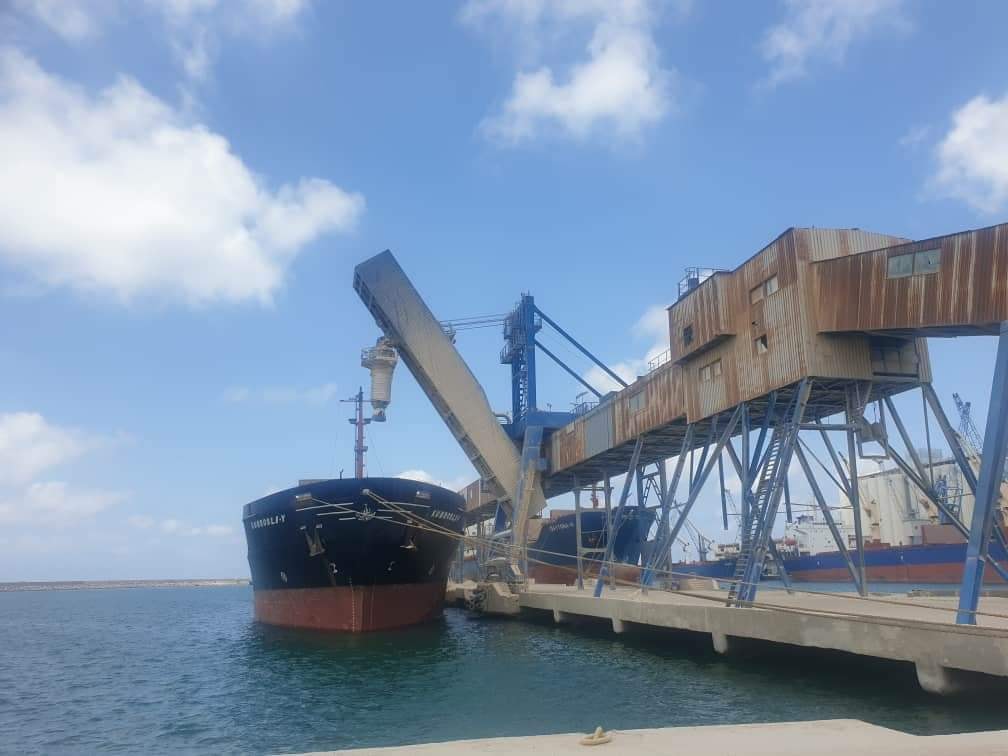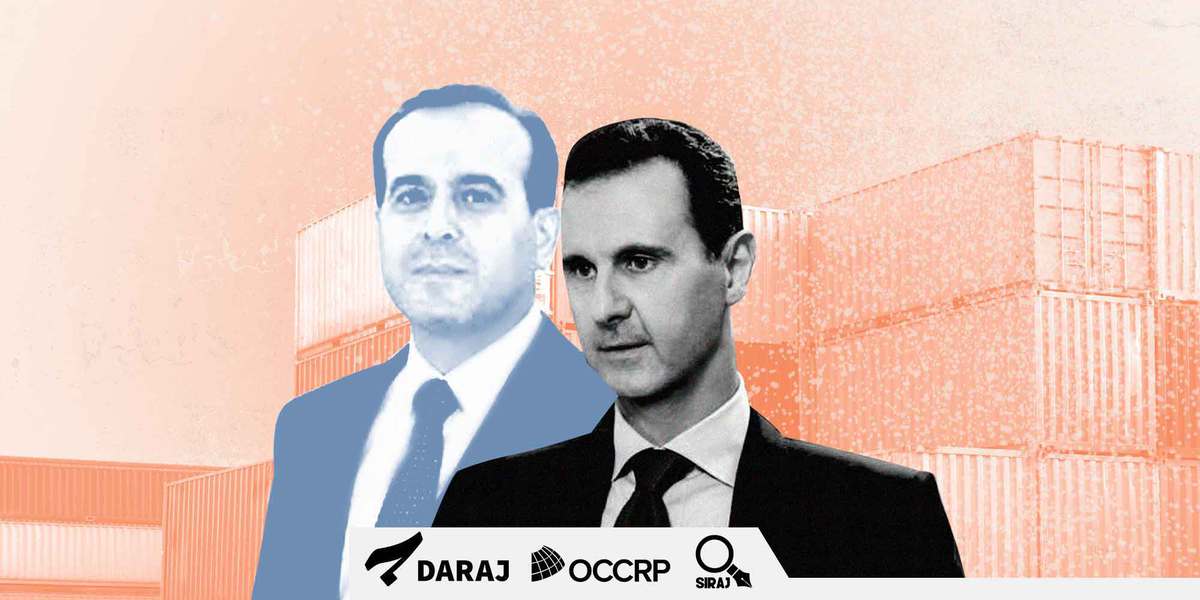On a warm May evening last year, a Comoros-flagged cargo ship named the Kubrosli-y disappeared from ship tracking systems off the coast of Turkey. A full week later, it reappeared near Cyprus before continuing on to dock in Ukraine.
Although tracking data offers no sign of the Kubrosli-y’s whereabouts during that week, photos posted on Facebook by a Syrian government agency two days before its reappearance provide clues to why its crew might have been keen to disguise their location.
One of the images shows Syrian oil and minerals minister Bassam Toumeh at the Mediterranean port of Tartus. Another shows the Kubrosli-y docked at one of two berths at the port that were custom-built to load phosphate, a prized mineral that has been a major economic lifeline for the sanctioned regime of President Bashar al-Assad.
Syria has some of the largest known reserves of the increasingly sought-after fertilizer ingredient. The phosphate industry collapsed when Islamic State militants seized the country’s largest mines in 2015, but production has revived since government forces recaptured them the following year, attracting buyers even from countries opposed to Assad’s regime.

The journey of the Kubrosli-y, and the techniques it deployed, offer a glimpse into the murky supply chain of Syrian phosphates as they make their way from regions torn apart by civil war to farmers across Europe. Every step of the way, the trade enriches the Syrian state, war profiteers, and people with deep ties to Russia’s elite.
Despite the risks of sanctions violations, Serbia, Ukraine, and four European Union states have imported over $80 million worth of Syrian phosphates since 2019, according to a new investigation by OCCRP member centers in seven countries, in partnership with Lighthouse Reports and Syrian Investigative Reporting for Accountability Journalism (SIRAJ).
The United States has imposed sanctions on both the Syrian government and the Russian company that appears to control much of Syria’s phosphate exports, Stroytransgaz. The EU has also sanctioned two key players: Syria’s Toumeh and Stroytransgaz’s owner, Gennady Timchenko, a billionaire tycoon and close ally of the Kremlin. But neither the U.S. nor the EU specifically prohibit the purchase of Syrian phosphates.
Experts say companies still run the risk of violating sanctions even if the phosphates trade is technically legal. A 2018 report by Politico that Greece was buying Syrian phosphates raised hackles in the European Parliament, and imports stopped soon after.
Even Stroytransgaz has tried to distance itself from the industry, insisting that it has no connection to two similarly named companies that dominate the trade today. But OCCRP and its partners found evidence of several links between Stroytransgaz and these firms.
Russia’s invasion of Ukraine in February has also led to increased pressure for European companies to cut ties to sanctioned Russian figures, such as Timchenko.
“Syrian phosphates are very bloody, not only because of the conflict in Syria but also what is happening in Ukraine,” said Glen Kurokawa, a phosphate analyst at commodity research group CRU. “Syria has to sell at a political discount because its goods are so toxic to handle.”
Asked about the imports, the EU Commission said it was up to individual countries to decide whether Syrian phosphate imports break sanctions. Authorities in Bulgaria, Ukraine, and Serbia confirmed they regard the trade as legal. Italian authorities did not reply to requests for comment.
Karam Shaar, a Syrian economist, said the trade shows how easily sanctions can be circumvented by opaque supply chains or by channeling funds and goods through the unknown subsidiaries of targeted companies.
“Of course exporting phosphates to Europe is a violation of sanctions,” he said. “But most of the countries don’t understand the structure of the organizations they have sanctioned.”
In the case of the Kubrosli-y, in the space of just three weeks it had set out from Istanbul, slipped in and out of Syria and sailed back through the Bosphorus to Nika Tera port in Ukraine, owned by a sanctioned oligarch.
“The ship owner doesn’t want anyone to know that his ship is coming from an economically sanctioned country like Syria,” said a Syrian ship captain from Tartous, speaking on condition of anonymity.
The Sierra Leone-flagged Daytona Prime disappeared from AIS systems south of Cyprus while headed in Syria’s direction on Jan. 20, 2019. Satellite images show the ship docked in Tartous two weeks later, where port documents reveal it visited the phosphates berths the following day.
The ship appeared again on AIS south of Cyprus before reaching Romania’s Constanta port on the Black Sea on February 16, the same day that Romanian customs records show a cargo of Syrian phosphates were imported.
Tartous port took most of its recent records offline in June 2020, but more recent phosphate shipments could be identified using open-source and satellite images.
A Honduran-flagged cargo ship called the Sea Navigator disappeared from AIS off the coast of Cyprus on January 4, 2022, and then reappeared heading north before reaching Romania’s Constanta port on January 21. During this time, it appeared in the background of a selfie taken by a worker in the Tartous phosphates berth which was posted to social media.
The International Maritime Organization, the U.N. agency that regulates global shipping, requires ships to broadcast AIS positions at all times, so ships with blackouts like these are problematic. That, in combination with the threat of sanctions and bad publicity, leaves European importers of Syrian phosphates working with ship owners on the legal fringes of the industry.
One of these is Aminos Maritime Ltd, which owns the Kubrosli-y, the ship that reporters noticed turning off its tracker in May last year before delivering phosphates to Ukraine. The ship has also made deliveries of Syrian phosphates to Romania and Greece. Aminos did not reply to a request for comment.
Another ship, the Prince Mouhammad, is owned by a Lebanon-based company whose largest shareholder is owned by relatives of Jihad al-Arab, a contractor close to former Prime Minister Saad Hariri. Last year, Arab was sanctioned by the U.S. for corruption. He did not respond to a request for comment either.
Ibrahim Olabi, a Syrian legal expert who monitors sanctions evasion, said the methods used to dodge sanctions in Syria would likely help Russian companies avoid new sanctions imposed by the European Union and United States over the Ukraine war.
“The Syrian phosphates trade shows why the EU sanctions system is not fit for purpose,” he said. “Sanctions evasion works and it’s not even that difficult.”
The industry’s dubious legality has also given rise to a complex network of proxies and middlemen.
‘Blood Money’
On a busy shopping street in London’s upmarket Kensington neighborhood, a small office above a secondhand clothing store is listed as the address of a British company called Resalper Trading Ltd.
The company sold $450,000 worth of Syrian phosphates to Ukrainian company Prime Organics in August 2020 — the country’s top importer of Syrian phosphates over the past two years — according to Ukrainian customs records. But Resalper Trading reported no financial activities in the year ending in May 2020, and only around $530 in assets that month, according to its most recent filings.
The office in Kensington belongs to formation agents Company Wizard and Quick File. When OCCRP contacted the 29-year-old Ukrainian who founded Resalper Trading in 2019, Ruslan Turkovskyi, he declined to comment.
Ukraine’s imports of Syrian phosphates ballooned from $3 million worth in 2018 to $15 million last year, despite Ukrainian sanctions imposed on Stroytransgaz and Timchenko. Most of those that arrive by sea enter through the Nika Tera port, owned by the sanctioned pro-Moscow oligarch Dmitry Firtash.
Sanctions expert Irene Kenyon, director of risk intelligence at the consultancy FiveBy Solutions, said using shell companies is a common strategy to disguise the fact that sanctioned entities or individuals were benefiting from a trade.
“Even though you might be legally in the right, you’re also giving blood money to a sanctioned human-rights violating regime and a sanctioned Russian oligarch,” she said.
Europe Quietly Resumed Syrian Phosphate Imports
Serbia and Ukraine are Europe’s top buyers of Syrian phosphates, while several EU states have also resumed imports.
Ukraine’s imports halted after the Russian invasion in February, but the country is far from the only buyer of Syrian phosphates.
In Serbia — Europe’s top buyer of Syrian phosphates in recent years — one importer was a former beauty company called Yufofarm. A Serbian business registry shows the company imported $26.9 million worth of products from Syria in 2021, though it did not specify what they were. Yufofarm declined to comment.
Yufofarm is owned by the business partner of Stanko Popovic, whose agriculture and fertilizer company, Elixir Group bought the Syrian phosphates Yufofarm imported. Elixir Group is the exclusive supplier of phosphoric acid — used to make fertilizers and animal feed — for the local operations of a major French conglomerate called Groupe Roullier.
“If the person you’re buying cargo from isn’t under sanctions then you’re further removed and aren’t necessarily busting sanctions yourself,” a maritime lawyer told OCCRP, speaking anonymously as they were not authorized to talk to the press. “This is the trade version of international money laundering.”
A spokesperson for the French company said it did “not use Syrian phosphate” and strictly complied with all sanctions.
Popovic acknowledged buying Syrian phosphates, which he had done since the 1970s, but told reporters that all his business transactions were legal. “We do not cooperate with any company in Syria on the basis of phosphate imports, or on any other basis,” he said.
Although Greece appeared to have stopped importing Syrian phosphates after the 2018 Politico report, at least four other EU member states — Italy, Bulgaria, Spain, and Poland — quietly resumed imports, OCCRP and its partners found. EU and UN trade data show that Italy started importing in 2020, Bulgaria in 2021, and Spain and Poland earlier this year.
Many of the EU’s imports of Syrian phosphates entered the bloc through Romania. Most of them were handled by two Middle Eastern companies, UAE-registered Blue Gulf Trading and Lebanon-registered Medsea Trading, both of which are owned by Lebanese businessman Afif Nazih Auf. He did not respond to requests for comment.
In Italy, Syrian phosphates are imported by Puccioni Spa, an established Italian fertilizer company. The company confirmed the purchases, but said it dealt with Syrian authorities through a broker, and that it did not work with Stroytransgaz.
In Bulgaria, Syrian phosphates are imported by a small Bulgarian company called Fertix EOOD, which was founded in 2017. Fertix’s managing director, Radostin Radev, has deep connections in Bulgaria’s agriculture industry, after starting his career at Agropolychim, one of the biggest fertilizer producers in the Balkans.
Radev said he had sold some of the Syrian phosphates to EuroChem Agro Bulgaria, a subsidiary of Eurochem Group AG, which is connected to Russian billionaire Andrey Igorevich Melnichenko. Melnichenko, who was sanctioned by the EU and the U.K. for supporting Russia’s war on Ukraine, recently withdrew from the company’s board.
For now, the trade in Syrian phosphates appears to be growing in spite of the many political complexities. Sergiy Moskalenko, director of Dnipro Mineral Fertilizer Plant, a Ukrainian firm that uses Syrian phosphates, told OCCRP that for them the purchases were a practical matter.
“Look, we need to eat,” he said. “In order to eat properly we need to supply the soil with fertilizers and to do this we must purchase the raw materials. To buy them, we unfortunately turn to…” He paused. “We take whatever phosphates are offered to us.”
Eva Constantaras (Lighthouse Reports), Hala Naserddine, (Daraj), Adam Chamseddine (Al Jadeed TV), Hervé Chambonniere (Le Telegramme), Ahmad Haj Hamdo, Ayman Makieh and Ahmad Obaid (SIRAJ) contributed reporting.




